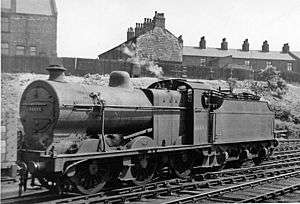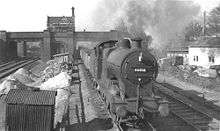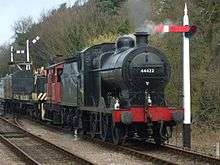LMS Fowler Class 4F
The London Midland and Scottish Railway (LMS) Fowler Class 4F is a class of 0-6-0 steam locomotive designed for medium freight work. They represent the ultimate development of Midland Railway's six coupled tender engines. Many trainspotters knew them as "Duck Sixes", a nickname derived from their wheel arrangement.[1]
| LMS Fowler Class 4F | |||||||||||||||||||||||||||||||||||||||||||||||
|---|---|---|---|---|---|---|---|---|---|---|---|---|---|---|---|---|---|---|---|---|---|---|---|---|---|---|---|---|---|---|---|---|---|---|---|---|---|---|---|---|---|---|---|---|---|---|---|
 44444 at Stockport, 1950 | |||||||||||||||||||||||||||||||||||||||||||||||
| |||||||||||||||||||||||||||||||||||||||||||||||
| |||||||||||||||||||||||||||||||||||||||||||||||
| |||||||||||||||||||||||||||||||||||||||||||||||
| |||||||||||||||||||||||||||||||||||||||||||||||

Background
The 4F was based on the 197-strong Midland Railway 3835 Class of 1911, with only a few modifications, primarily the adoption of left-hand drive instead of right-hand drive. They originally had been designed by Henry Fowler, who from 1925 became CME of the LMS.
Midland Railway locomotives were notorious for their short axle-box bearings, which were prone to overheating. This design feature was perpetuated in the LMS 4F. The problem was eventually solved with the fitting of mechanical lubricators.
Construction
.jpg)
The LMS constructed 530 of the locomotives between 1923 and 1928, numbered sequentially from where the Midland engines left off from 4027. A further 45 examples were reluctantly authorised by William Stanier in 1937 at the behest of the operating department.
| LMS nos. | BR nos. | Lot No. | Date built | Built by |
|---|---|---|---|---|
| 4027–4034 | 44027–44034 | 7 | 1924 | Derby |
| 4035–4056 | 44035–44056 | 7 | 1925 | Derby |
| 4057–4081 | 44057–44081 | 8 | 1925 | North British Loco |
| 4082–4106 | 44082–44106 | 9 | 1925 | Kerr Stuart |
| 4107 | 44107 | 10 | 1924 | Crewe |
| 4108–4158 | 44108–44158 | 10 | 1925 | Crewe |
| 4159–4176 | 44159–44176 | 10 | 1926 | Crewe |
| 4177–4178 | 44177–44178 | 11 | 1924 | St. Rollox |
| 4179–4206 | 44179–44206 | 11 | 1925 | St. Rollox |
| 4207–4216 | 44207–44216 | 29 | 1925 | Derby |
| 4217–4287 | 44217–44287 | 29 | 1926 | Derby |
| 4288–4301 | 44288–44301 | 29 | 1927 | Derby |
| 4302–4311 | 44302–44311 | 28 | 1926 | Crewe |
| 4312–4322 | 44312–44322 | 30 | 1927 | St. Rollox |
| 4323–4331 | 44323–44331 | 30 | 1928 | St. Rollox |
| 4332–4342 | 44332–44342 | 31 | 1926 | Kerr Stuart |
| 4343–4356 | 44343–44356 | 31 | 1927 | Kerr Stuart |
| 4357–4361 | 44357–44361 | 32 | 1926 | Andrew Barclay |
| 4362–4381 | 44362–44381 | 32 | 1927 | Andrew Barclay |
| 4382–4399 | 44382–44399 | 33 | 1926 | North British Loco |
| 4400–4406 | 44400–44406 | 33 | 1927 | North British Loco |
| 4407–4436 | 44407–44436 | 42 | 1927 | Derby |
| 4437–4446 | 44437–44446 | 43 | 1927 | Crewe |
| 4447–4456 | 44447–44456 | 43 | 1928 | Crewe |
| 4457–4466 | 44457–44466 | 44 | 1928 | Horwich |
| 4467–4476 | 44467–44476 | 45 | 1928 | St. Rollox |
| 4477–4506 | 44477–44506 | 46 | 1927 | North British Loco |
| 4507–4556 | 44507–44556 | 56 | 1928 | Crewe |
| 4562–4575 | 44562–44575 | 137 | 1937 | Crewe |
| 4577–4586 | 44577–44586 | 146 | 1939 | Derby |
| 4587–4596 | 44587–44596 | 147 | 1939 | Derby |
| 4597–4604 | 44597–44604 | 147 | 1940 | Derby |
| 4605–4606 | 44605–44606 | 147 | 1941 | Derby |
The missing numbers (4)4557–61 relate to five locomotives built for the Somerset and Dorset Joint Railway to the Midland Railway 3835 Class design in 1922, and taken into LMS stock in 1930.
All entered British Railways stock in 1948. BR added 40000 to their numbers. They were all withdrawn between 1959 and 1966.
Accidents and incidents
- On 12 February 1929, locomotive No. 4491 was hauling a freight train that was in a head-on collision with an express passenger train at Doe Hill station, Derbyshire due to a signalman's error. Two people were killed.[2]
- On 4 September 1942, locomotive No. 4541 was hauling a freight train that overran the end of a loop in blackout conditions at Todmorden, Yorkshire and was derailed.[3]
- On 6 June 1961, a locomotive of the class was running light when it was in a head-on collision with a freight train at Carlisle Citadel station, Cumberland.[3]
Withdrawal
Withdrawals from stock occurred between 1959 and 1966.
| Year | Quantity in service at start of year | Quantity withdrawn | Locomotive numbers |
|---|---|---|---|
| 1959 | 575 | 44 | 44032/50/58/64/72–73/85/95, 44103/08/16/20/36/40/42/44–45/61/73/75, 44201/04/17/25/27/30/85/91/93/98, 44306/13/16–17/26/57/61/65/69/72/82–83/85, 44423. |
| 1960 | 531 | 41 | 44029/31/52/77/93, 44163, 44343/60/66/75/91, 44406/10/12/15/27/30/38/53/59/71/73/80/83/88/95–96/98, 44502–03/06–07/10–11/13/15/46/55/63/85, 44600. |
| 1961 | 490 | 23 | 44033/67/77/82/88/90, 44105/07/11/41/47–48/52, 44206/49, 44319/24/71, 44409/74/77, 44547/90. |
| 1962 | 467 | 74 | 44036/62/70/87, 44107/22/28–29/38/43/54/58–59/66/87/89/93–94/96/98–99, 44216/24/28/34/45/51/53–58/67/73/81/83, 44307/12/14/18/20/22–23/25/28–31/38/40/68/88/93/97, 44404/07/17/35/38/87/91, 44508–09/18/21/37/50/53/73/76/79/94, 44606. |
| 1963 | 393 | 134 | 44034/46–47/53/55/66/68–69/71/74/83/85/89/94/97–98, 44100–01/12/14/19/26/32–33/50–51/53/62/64/68/74/76/83–84/86/90, 44202/05/07–09/12/19/23/31–32/37–39/41/52/61–62/65/68/70/72/74/80/82/87/92/97/99, 40303/08–09/35–36/41–42/45/51–52/54/59/63/70/74/78/87/95/98, 44411/13/16/18–19/24/26/32/34/37/42/44–45/47–48/54–55/57/65/69–70/72/75–76/85/93–94, 44504/17/19/23–24/26/30/32/35/39/41–42/45/51/56/62/68/74/82/84/92/95–96/98. |
| 1964 | 259 | 153 | 44027/30/38–42/45/48–49/51/54/59–60/78–80/91–92/96, 44102/06/09–10/17/24/30–31/34/46/49/56/65/67/71–72/77–80/82/85/91/97, 44213–14/20–22/26/29/33/35–36/40/42/44/46/48/59–60/75/79/84/86/88–90/95–96, 44301–02/04/15/21/27/32–33/37/44/48/62/64/67/73/76/79–81/84/92/96/99, 44403/21/28/31/33/36/39–41/52/60–61/63–64/67–68/78–79/81–82/84/97/99, 44501/12/14/16/20/29/31/33–34/38/40/43/49/52/54/64–67/69/71–72/75/77–78/80–81/83/86/88–89/91/93, 44602–05. |
| 1965 | 106 | 95 | 44028/35/43–44/56–57/61/63/65/75–76/81/86/99, 44115/18/21/23/25/27/31/37/39/55/57/60/69–70/81/88/92/95, 44200/10–11/15/43/47/50/63–64/66/69/71/76–77/94, 44300/05/34/39/46–47/49–50/53/56/58/86/89–90, 44400–02/08/14/20/22/25/29/43/49–51/56/58/62/66/86/89–90, 44505/22/27–28/36/44/48/70/87/97/99, 44601. |
| 1966 | 11 | 11 | 44113, 44203/18/78, 44310–11/77/94, 44405, 44500/25. |
Preservation

Three LMS-built 4Fs survive, with the first-built LMS 4F, No. (4)4027, being part of the National Collection. In addition, one Midland 4F, No. (4)3924 has also survived.
| Numbers | Built | Builder | Withdrawn | Service Life | Location | Condition | |
|---|---|---|---|---|---|---|---|
| LMS | BR | ||||||
| 4027 | 44027 | Nov 1924 | Derby Works | Nov 1964 | 40 Years | Vale of Berkeley Railway[4] | Overhaul in progress following the loco's arrival at Sharpness. |
| 4123 | 44123 | Jul 1925 | Crewe Works | Jun 1965 | 39 Years, 11 months | Avon Valley Railway | Restoration in progress. |
| 4422 | 44422 | Oct 1927 | Derby Works | Jun 1965 | 37 Years, 8 months | Churnet Valley Railway[5] | Under overhaul. Returned to the CVR in December 2019 following the termination of its previous loan agreement with the West Somerset Railway. |
Models
The 4F has been modelled by Lima (O, HO and N Gauge) and Graham Farish (N Gauge, still produced under the Bachmann label). Airfix produced a tender drive model of the 4F in OO Gauge in 1978. Production of this was continued by Dapol after it acquired Airfix models in 1985, and were subsequently sold to Hornby in the late 1990s. They upgraded the model to loco drive in 2012. Bachmann have produced a version of the Midland railway variant of the 4F since 2012.
References
- Platforms Souls (Chap.1), Whittaker, Nicholas, Gollancz, London, 1995
- Earnshaw, Alan (1991). Trains in Trouble: Vol. 7. Penryn: Atlantic Books. p. 22. ISBN 0-906899-50-8.
- Earnshaw, Alan (1990). Trains in Trouble: Vol. 6. Penryn: Atlantic Books. pp. 27, 39. ISBN 0-906899-37-0.
- "4F 4027". Vale of Berkeley Railway. Retrieved 18 May 2017.
- Holden, Michael (3 December 2019). "Steam locomotive 44422 arrives at the Churnet Valley Railway". RailAdvent. Retrieved 3 December 2019.
- Sources
- David Hunt, John Jennison Bob Essery & Fred James LMS Locomotive Profiles No.10: The Standard Class 4 Goods 0-6-0s ISBN 1-905184-35-2 (pictorial supplement ISBN 1-905184-37-9)
- Rowledge, J.W.P (1975). Engines of the LMS, built 1923–51. Oxford: Oxford Publishing Company. ISBN 0-902888-59-5.
External links
| Wikimedia Commons has media related to LMS Fowler Class 4F. |